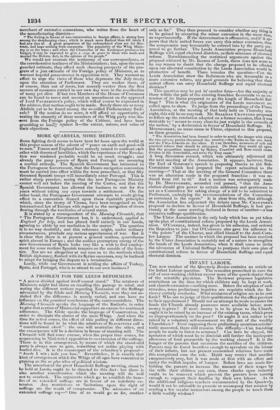A PROBLEM FOR THE LEEDS REFORMERS.
" A HOUSE divided against itself cannot stand." The retainers of Ministers might. feel alarm on recalling this passage to mind, and noting the different notions regarding Extension of the Suffrage advocated by the Globe and Morning Chronicle, were they not sa- tisfied that the difference is merely verbal, and can have no influence on the practical conclusions of the controversialists. The Morning Chronicle speaks the language of the Radicals, in order to give that section of Ministerial supporters an excuse Ibr continued adherence. The Globe speaks the language of Conservatism, in order to dissipate the alarms of the mere 'Whigs. And when the time for action comes, the effect of this pulling in different direc- tions will be found to be what the admirers of BLACKSTONE call a " constitutional check" : the one will neutralize the other, and the consequence will be a decision in favour of standing still. The Chronicle will find some excuse, when the proper time comes, for acquiescing in Ministerial opposition to au extension ot' the suffrage. There is in this arrangement, by means of which the stand-still party is always sure to gain, something not unlike playing with loaded dice. It is the counterpart of the schoolboy's proposal- " heads I win ; tails you lose." Nevertheless, it is exactly that kind of arrangement which the Whigs of all ages have concurred in praising as the ne plus ultra of political wisdom. The attention of the great Household Suffrage meeting, about to be held at Leeds, ought to be directed to this filet : but there is also another consideration which the meeting will do well not to overlook. The arguments which go to establish the bene- fits of an extended suffrage are in favour of an indefinite ex- tension. Any restrictions or limitations upon the right of suffrage arc the result of compromise. The advocates of an extended suffrage say—" One of us would go so fort ;mother only so far." They then proceed to consider whether any thing is to be gained by accepting the minor extension in the mean time, as experimentally. If the determination is affirmative, and if it ap. pears that their united forces can carry this minor extension, then the compromise may honourably be entered into by the party pre.. pared to go further. The Leeds Association propose Household Suffrage with equal electoral districts, as their minimum of electoral reform. Notwithstanding the statistical arguments against this proposal adduced by Mr. !lames of Leeds, there does not seem to
be any reason to doubt that the change proposed to be effected upon our electoral constitution by the Leeds Association would be productive of benefit. There remains the question—Can the Leeds Association show the Reformers who are favourable to a more extensive reform, any good grounds for believing that their united efforts can carry Household Suffrage and equal electoral districts ?
This question may be put in" another form—Are the majority of those within the pale of the existing franchise favourable to an ex. tension of its limits prepared to go the length of Household Suf. frage ? This is what the originators of the Leeds movement are called upon to show. To judge from the proceedings of the Ulster Association, at the meeting of that body held on Thursday sea-
night, this will be no easy task. Mr. SIJARMAN CRAWFORD proposed to follow up the resolution adopted on a former occasion, that it was desirable to " secure to every class its just weight in the councils of the nation," by a declaration in favour of Household Suffrage. Dr. MONTGOMERY, no mean name in Ulster, objected to this proposal, on these grounds- " The Association had been formed in order to avoid the danger with which the two exireme parties threatened the country—the Tories on the one band, and the Ultra-Liberals on the other. It was, therefore, measures of safe and practical reform that should be attempted. On those they would all agree. But the proposition supported by Messrs. Crawford and Ross would create division in the Association, and serve the Tory cause."
A long discussion ensued, which was ultimately adjourned till the next meeting of the Association. It appears, however, from
the Earl of GOSFORD'S speech in proposing thanks to the Sub-
Committee which had prepared the report submitted to the meeting—" That at the meeting of the General Committee there was an alteration made in the proposed franchise : it was re.
diked from lot, to 61." And a motion was subsequently made by Dr. MONTGOMERY, seconded and passed, " that the Asso-
ciation should give power to certain noblemen and gentlemen to act as a Committee for taking charge of a bill to be submitted to Parliament, embodying the recommendations of the Committee
as contained in the report." It is clear from this, that although. the Association has adjourned the debate upon Mr. CRAWFORD'S proposal to declare in favour of Household Suffrage, it had pre- viously at the same meeting declared in favour of another—a less extensive suffrage-qualification.
The Ulster Association is the only body which has as yet taken up the plan of constitutional reform proposed by the Leeds Associ-
ation. O'CONNELL, indeed, has given in his adhesion, and ordered
the Repealers to join : but O'Cosisieee also gave his adhesion to. " the points " of the Charter, and allied himself to the Anti-Corn- law League. The manner in which the proposal has been received by the Ulster Association is certainly not of a nature to strengthen the hands of the Leeds Association, when it shall come to invite the advocates of Universal Suffrage to postpone their own plan of constitutional reform in favour of Household Suffrage and equal electoral districts.






















 Previous page
Previous page